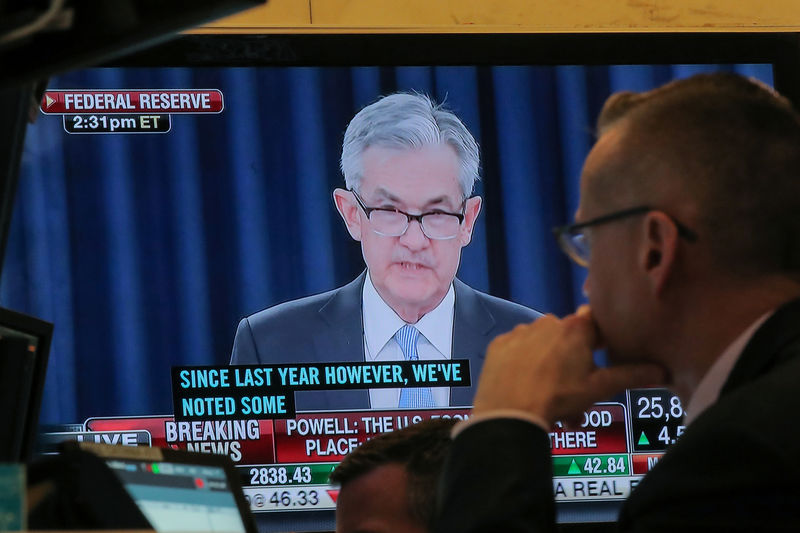By Noreen Burke
Investing.com -- The Federal Reserve is widely expected to announce its first interest rate hike since 2018 on Wednesday as policymakers try to balance the twin threats of inflation, which is running at a four-decade high, and economic uncertainty arising from the war in Ukraine. The Bank of England is expected to hike rates again this week, while central banks in Japan, Turkey, and Brazil will also hold policy meetings. The massive rally in commodities looks set to continue, while stocks continue to struggle. Here’s what you need to know to start your week.
- Fed rate hike
The Fed has clearly signaled that it intends to deliver a quarter-point interest rate hike after its two-day policy meeting concludes on Wednesday, to combat soaring inflation, which at 7.9% is far above the Fed’s 2% target.
A larger half percentage point rate hike is no longer on the cards since Russia’s invasion of Ukraine sent commodity prices soaring and triggered major uncertainty in financial markets.
Massive rallies in commodities have added to pressure on global central banks to tighten monetary policy and curb inflation. But this has sparked concerns that higher interest rates will act as a drag on economic growth at a time when price increases are already weighing on consumers.
The Fed will be releasing its updated ‘dot plot’ which tracks projections for interest rates, with investors keen to see how the war is affecting the monetary policy outlook. Investors will also be on the lookout for any guidance on plans for the central bank’s almost $9 trillion balance sheet.
- Bank of England
The BOE is expected to hike rates for the third time since December after its meeting on Thursday, but officials are expected to opt for another quarter percentage point increase, rather than a larger half-point move.
BOE Governor Andrew Bailey is expected to signal that more rate hikes are coming, with officials keen to mitigate against the risk of high inflation becoming entrenched.
Consumer price inflation in the U.K. hit an almost 30-year high in January at 5.5% because of higher energy costs and supply chain bottlenecks.
As with the Fed, investors will be watching for the bank’s assessment of how the war in Ukraine is affecting the outlook for interest rates.
Ahead of the BOE meeting, the U.K. is to release its latest employment report on Wednesday, with the earnings component likely to be in sharp focus as living costs escalate.
- Commodity rally
The recent massive rally in commodity prices could potentially be set to continue for an extended period with a quick resolution to the war in Ukraine in doubt.
The war and ensuing sanctions on Russia sent oil prices to 14-year highs and natural gas prices near records. Prices for wheat and copper stand near all-time highs, while a doubling of the price of nickel last week forced the London Metals Exchange to halt trading in the metal.
U.S. government officials have called on domestic and global producers to ramp up oil output to offset the supply shock and there is talk around potential supply additions from Iran, Venezuela, and the United Arab Emirates.
In the coming week, market watchers will be turning their focus to reports from the International Energy Administration and the Organization of the Petroleum Exporting Countries.
- Stocks struggle
The benchmark S&P 500 logged its second straight weekly decline last week while the Dow fell for a fifth straight week as uncertainty over the conflict in Ukraine weighed and attention turned to the upcoming Fed meeting.
Stocks have struggled this year as concerns about the Russia-Ukraine crisis have deepened a sell-off initially fueled by worries over higher bond yields with the Fed on course to tighten monetary policy. The S&P 500 is down 11.8% so far in 2022.
“While investors have accepted the Fed will likely begin raising rates next week, there is still a lack of clarity of how far and how fast the Fed moves from there," Lindsey Bell, Ally's Chief Markets & Money Strategist wrote in a note cited by Reuters on Friday.
"With the market taking action (in the form of volatility) and possibly reducing demand, the Fed may not have to move as quickly. Still, the pace of inflation will be the key driver of policy changes for the better part of this year."
- Central banks
The dovish Bank of Japan is not expected to announce any changes to monetary policy when its two-day meeting ends on Friday, with inflation still running far behind the rest of the world, for now.
In emerging markets, Turkey’s central bank is expected to keep its one-week repo rate on hold at 14% on Thursday despite inflation reaching a two-decade high of 54% in February. President Tayyip Erdogan’s unconventional approach to monetary policy favors looser rather than tighter monetary policy to combat inflation.
The Central Bank of Brazil also meets on Thursday and is expected to hike rates to 11.75%, in what would be the ninth straight increase in a row amid an annual inflation rate of 10%.
Russia’s central bank is to meet on Friday after having already doubled its interest rate to an all-time high of 20% following the invasion of Ukraine, in a bid to offset some of the impact from harsh international sanctions. Russia’s stock market will remain closed again this week.
--Reuters contributed to this report
